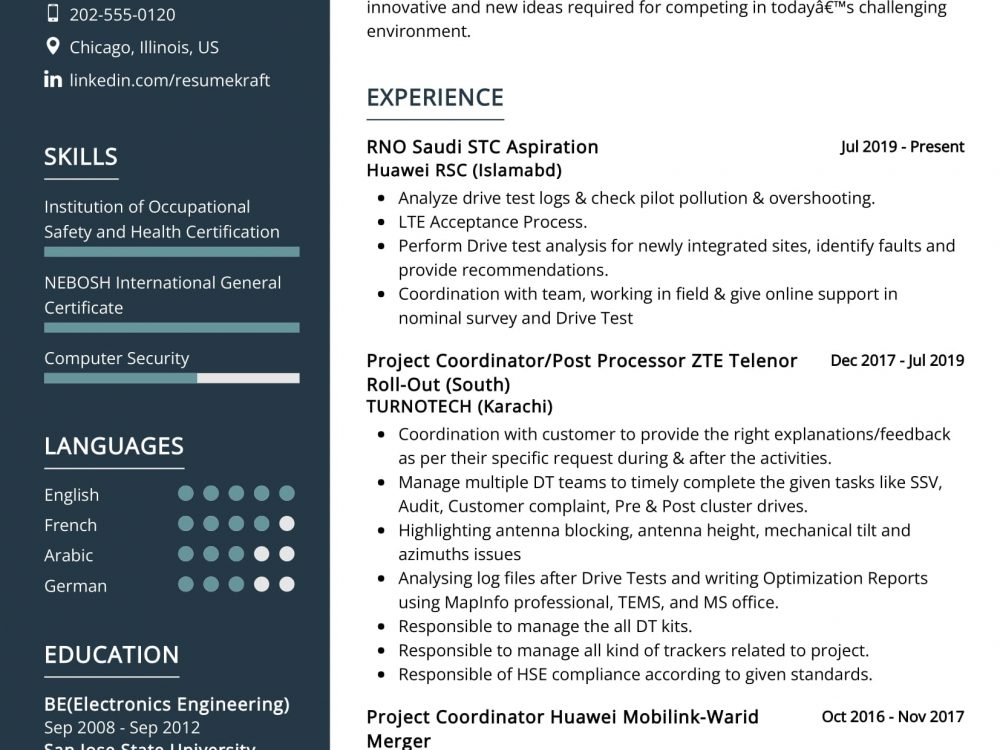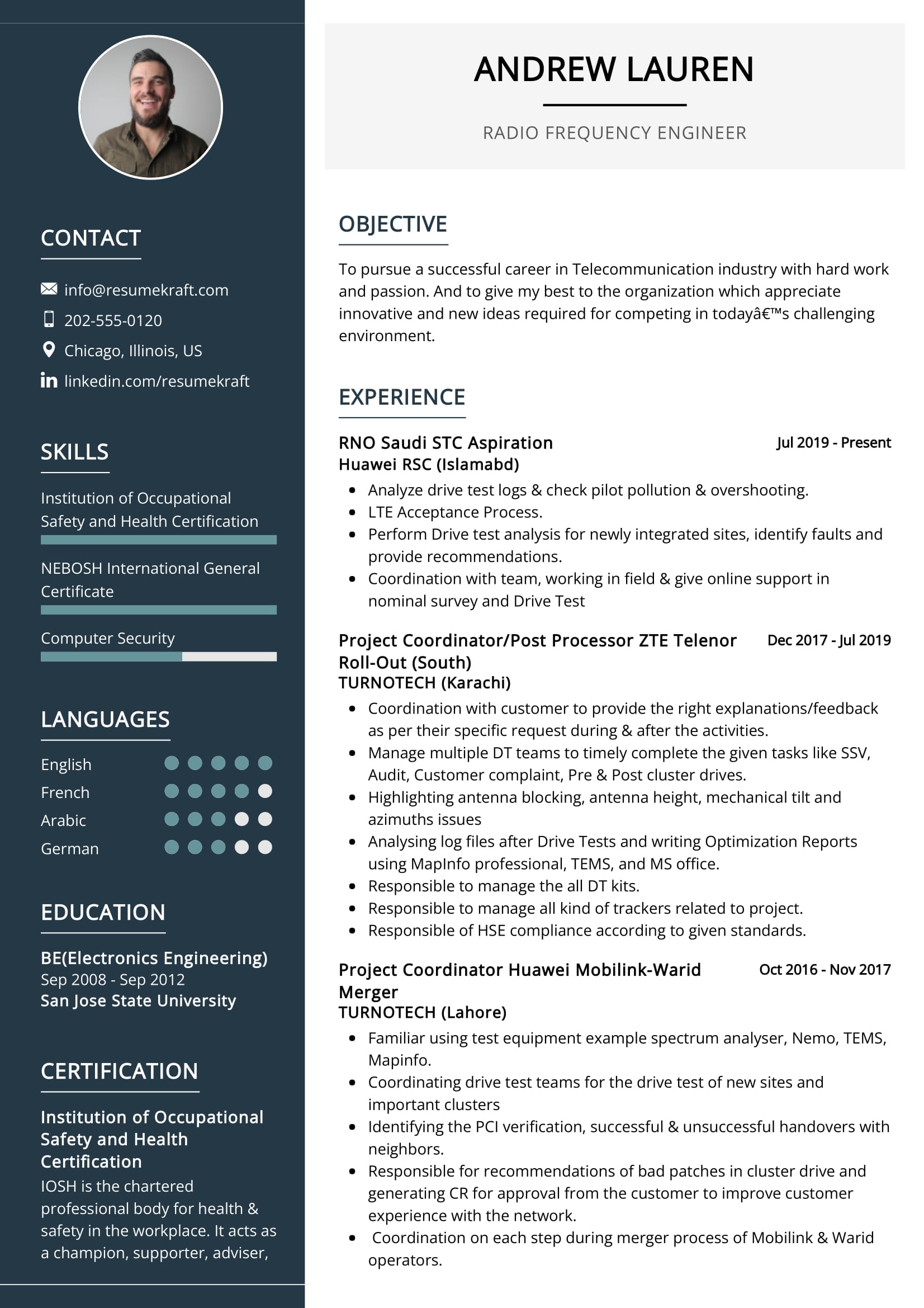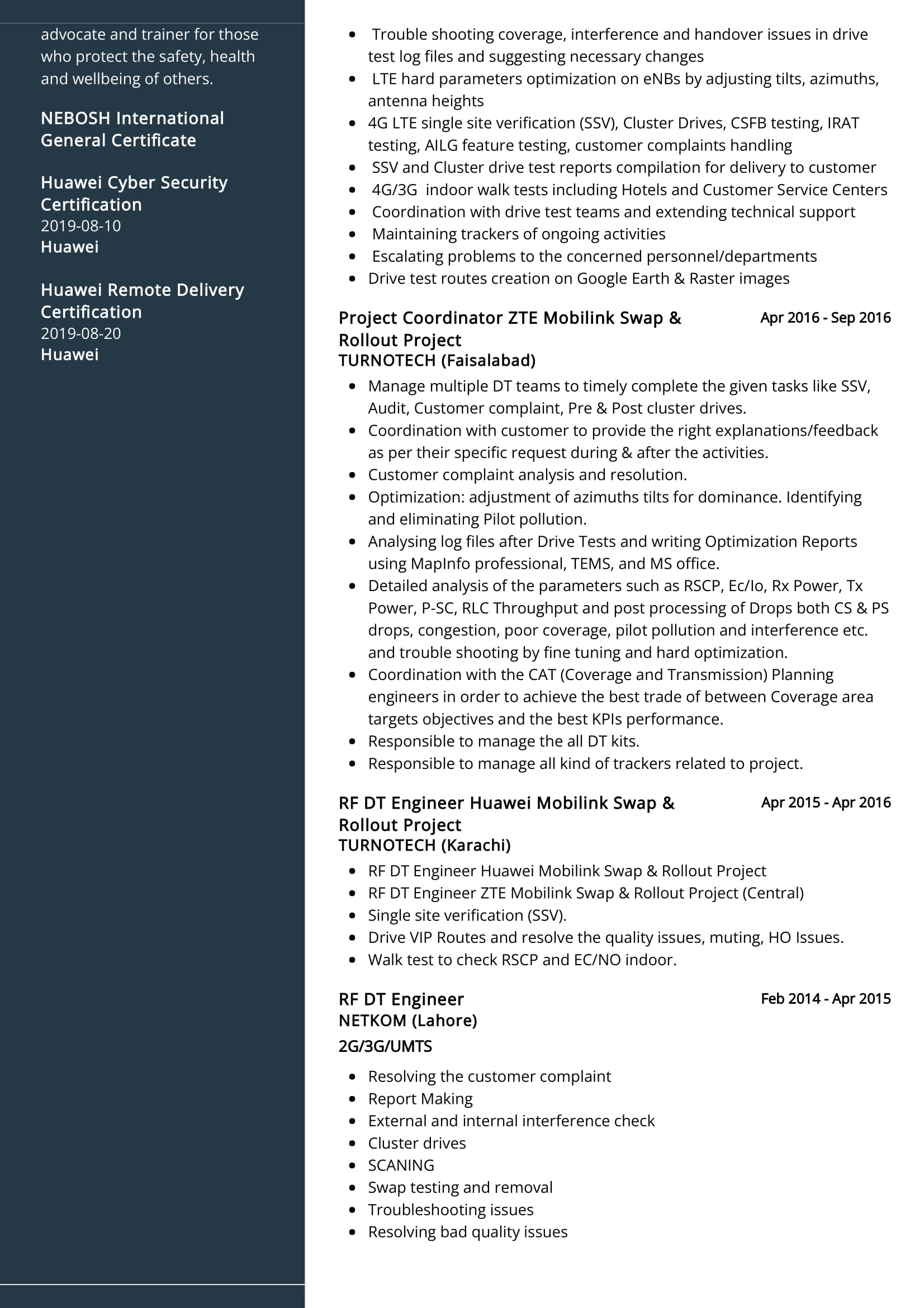What should be included in a Radio Frequency Engineer Resume?
When crafting a resume for a Radio Frequency Engineer position, it is essential to include the right information to make a positive impression on potential employers. Radio Frequency Engineers are responsible for designing, testing, and maintaining radio frequency systems and components. They must be highly knowledgeable in the theory and principles behind radio communication and transmission systems, as well as the necessary technology and engineering skills to apply to the job.
When writing a Radio Frequency Engineer resume, it is important to include details about your experience and education in the field. This includes relevant work experience such as designing and testing radio frequency systems, conducting experiments, analyzing results, and diagnosing problems. You should also list any certifications or professional development activities that are related to the position. It is also important to emphasize any technical skills that you possess, such as knowledge of software and coding languages.
In addition to detailing your experience, it is also important to highlight any specific technical skills that you possess. This includes knowledge of specific radio frequency systems, antennas, and communication systems. If you have any specializations in the field, such as a focus on wireless systems or satellite communication systems, it is essential to include this information as well.
Finally, it is important to include any relevant awards or honors that you have received. This will showcase your professional accomplishments and demonstrate your commitment to the field. Additionally, it is important to include any continuing education classes or seminars that you have attended in relation to Radio Frequency Engineering. This will show that you are committed to staying current in the field and constantly striving to better your skills.
What skills are most important for Radio Frequency Engineer?
When it comes to landing a job as a Radio Frequency Engineer, having the right skills is essential. It is important for a Radio Frequency Engineer to possess a variety of technical, problem-solving and communication skills in order to be successful in the role.
First and foremost, strong knowledge of radio frequency systems and technologies is essential for any Radio Frequency Engineer. A thorough understanding of the principles and best practices of radio frequency engineering is necessary to carry out the job, as is the ability to design and implement radio frequency systems. An understanding of antennas and propagation in various environments is also key.
In addition, a Radio Frequency Engineer should have strong problem-solving skills, as they are often called upon to identify and troubleshoot issues with RF systems. They should also be able to perform tests to determine system performance and identify areas in need of improvement.
Another important skill for a Radio Frequency Engineer is the ability to effectively collaborate and communicate with other engineers, technicians and stakeholders. They must be able to explain their ideas and solutions in a way that can be understood by others.
Finally, the ability to work in a fast-paced environment and adapt to changing needs is an important skill for any Radio Frequency Engineer. With rapidly evolving technologies, Radio Frequency Engineers must be able to stay up to date on the latest developments and be prepared to apply them to their work.
Overall, possessing a combination of technical, problem-solving and communication skills is essential for a successful career as a Radio Frequency Engineer. Those interested in this role should seek to develop these skills and demonstrate them in their resume and interviews.
What is the job description of the Radio Frequency Engineer?
A radio frequency engineer is a highly specialized professional who is responsible for designing and maintaining advanced radio frequency systems. This role is vital in the development and maintenance of radio frequency communications, broadcasting, and surveillance systems. Radio frequency engineers are highly trained professionals who are skilled in the use of sophisticated engineering techniques and technologies.
The duties and responsibilities of a radio frequency engineer involve analyzing and designing radio frequency systems, developing new radio frequency technologies, and managing radio frequency systems. They must also be able to troubleshoot and repair existing radio frequency systems. Radio frequency engineers must be able to work with a team of other engineers, technicians, and designers to develop, test, and implement radio frequency systems. They must also be able to explain their designs to other engineers, technicians, and customers.
Radio frequency engineers typically hold a bachelor’s degree in engineering or a related field, such as electrical engineering. They must have knowledge of radio frequency systems, including signal processing, transmission, and reception. Radio frequency engineers must also have excellent problem-solving and communication skills, as well as the ability to work well with teams. Experience in the development of radio frequency systems, as well as in the implementation of new technologies, is also essential for the successful execution of this role.
What is a good objective for a Radio Frequency Engineer resume?
A career objective is an important part of any resume, especially for a Radio Frequency Engineer. An effective objective should communicate your qualifications, skills, and experience that make you the best candidate for the position. It should also demonstrate your enthusiasm for the job and your interest in the industry.
When writing your objective for a Radio Frequency Engineer resume, make sure to emphasize your knowledge and experience in radio frequency designs and technologies. Include key phrases such as “Radio Frequency engineering” and “RF design” so that employers can immediately recognize your qualifications. Additionally, include specific skills related to the job such as circuit board design and troubleshooting, antenna design, and signal analysis.
It’s also a good idea to mention any certifications or licenses you have from organizations such as the Society of Broadcast Engineers (SBE) and the Institute of Electrical and Electronics Engineers (IEEE). This will show employers that you are knowledgeable about the industry and have the necessary qualifications for the job.
In short, a strong objective for a Radio Frequency Engineer resume should not only emphasize your qualifications, but also demonstrate your enthusiasm for the job and the industry. Use key phrases to emphasize your knowledge, include certifications and licenses, and focus on the skills necessary for the position.
What are 5 responsibilities of a Radio Frequency Engineer?
Radio Frequency (RF) Engineers are responsible for a wide range of tasks, including designing, building, testing, and maintaining various types of RF systems. They are also responsible for troubleshooting and resolving issues with RF systems. Below are five of the primary responsibilities of a Radio Frequency Engineer:
1. Designing and Implementing RF Systems: A Radio Frequency Engineer is responsible for designing and implementing the various components of an RF system, such as antennas, transceivers, amplifiers, repeaters, receivers, and cables. They must have an in-depth knowledge of RF technology and be able to design systems that meet the needs of their clients.
2. Testing and Troubleshooting RF Systems: RF Engineers must be able to accurately test and troubleshoot RF systems. This involves identifying and diagnosing any problems in the system and making the necessary repairs or adjustments to restore the system to its optimal performance.
3. Maintaining the RF System: RF Engineers must regularly maintain and update the system to ensure its continued operation and to ensure that any new technologies can be integrated into the system. This includes regularly inspecting and replacing components as needed.
4. Developing System Specifications: Radio Frequency Engineers are also responsible for developing system specifications, which are essential for ensuring the proper operation of the system. These specifications include the physical components, frequency bands, and power levels of the system.
5. Reporting System Performance: Radio Frequency Engineers must also report on the performance of the system, such as its operation, any problems encountered, and any recommendations they may have for improving the system. This helps to ensure that the system remains at its optimal performance.
What are the career prospects in the Radio Frequency Engineer?
.Radio Frequency (RF) engineering is a highly specialized field, with large potential for job growth and excellent career prospects. It is a field that combines the principles of electrical engineering and communications technology, with a focus on the transmission and reception of radio signals. The field of RF engineering is constantly evolving, as new technologies and advancements are made. This means that the career prospects of RF engineers are very good.
The roles of RF engineers are diverse, and can involve the design, installation and maintenance of radio systems, including radios, antennas and other related equipment. They also work to ensure these systems are working correctly, and troubleshoot any problems that may arise. This means that RF engineers must have strong technical, analytical, and problem solving skills, as well as a good understanding of the principles of radio frequency engineering.
As RF engineering is a very specialized field, it is important for those with an interest in pursuing a career as an RF engineer to have a solid educational background in the field. This typically involves a degree in Electrical, Electronics or Telecommunications Engineering, or a related field. It is also beneficial to obtain certifications in RF engineering, such as Certified RF Engineer (CRE) or Certified Radio Frequency Engineer (CRE).
In addition to having the right academic qualifications, those wishing to pursue a career in RF engineering should also have a good understanding of the field, and be able to keep up with the rapidly changing technology. Good interpersonal and communication skills are also important, as RF engineers will often need to work with other professionals in the field.
Overall, the job prospects for RF engineers are very good.



